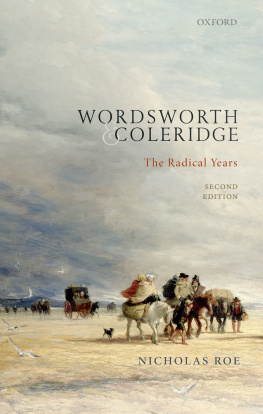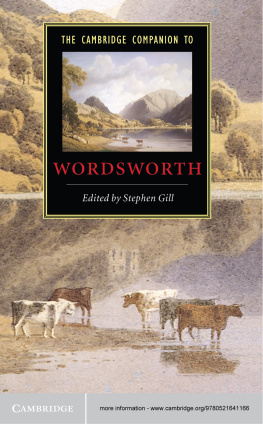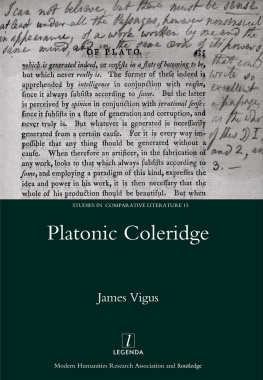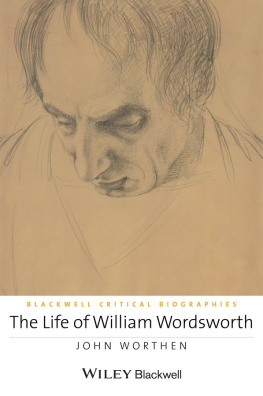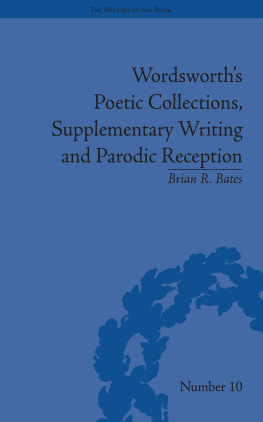Wordsworth and Coleridge

Great Clarendon Street, Oxford, OX2 6DP, United Kingdom
Oxford University Press is a department of the University of Oxford. It furthers the University's objective of excellence in research, scholarship, and education by publishing worldwide. Oxford is a registered trade mark of Oxford University Press in the UK and in certain other countries
Nicholas Roe 1988
The moral rights of the author have been asserted
First Edition published in 1988
Second Edition published in 2018
Impression: 1
All rights reserved. No part of this publication may be reproduced, stored in a retrieval system, or transmitted, in any form or by any means, without the prior permission in writing of Oxford University Press, or as expressly permitted by law, by licence or under terms agreed with the appropriate reprographics rights organization. Enquiries concerning reproduction outside the scope of the above should be sent to the Rights Department, Oxford University Press, at the address above
You must not circulate this work in any other form and you must impose this same condition on any acquirer
Published in the United States of America by Oxford University Press 198 Madison Avenue, New York, NY 10016, United States of America
British Library Cataloguing in Publication Data
Data available
Library of Congress Control Number: 2018939293
ISBN 9780198818113
ebook ISBN 9780192565457
Printed and bound by CPI Group (UK) Ltd, Croydon, CR0 4YY
Links to third party websites are provided by Oxford in good faith and for information only. Oxford disclaims any responsibility for the materials contained in any third party website referenced in this work.
Originally published in the Oxford English Monographs series
To the memory of
JOHN THELWALL
Citizen, Poet, Prophet
17641834
And please whats Hulks? said I.
Thats the way with this boy! exclaimed my sister, pointing me out with her needle and thread, and shaking her head at me. Answer him one question, and hell ask you a dozen directly. Hulks are prisonships, right cross th meshes. We always used that name for marshes, in our country.
I wonder whos put into prisonships, and why theyre put there? said I, in a general way, and with quiet desperation.
It was too much for Mrs Joe, who immediately rose. I tell you what, young fellow, said she, I didnt bring you up by hand to badger peoples lives out. People are put in the Hulks because they murder, and because they rob, and forge, and do all sorts of bad; and they always begin by asking questions.
(Charles Dickens, Great Expectations, ch. 2)
Preface, 19882018
On Tuesday 30 September 1794 the following advertisement appeared on the front page of the Morning Chronicle:
Those Families whose Husbands and Fathers are now in Confinement under a Charge of high treason , and whose Trials will come on in a few Days intreat the immediate pecuniary assistance of the real Friends to Liberty.
The husbands and fathers charged with treason were the leaders of the London Corresponding Society and the Society for Constitutional Information. They had been arrested in May and held in the Tower and Newgate over the summer; not surprisingly, their dependents were in need of support after four monthshence the subscription organized by the Corresponding Societys Committee of Correspondence.
The real Friends to Liberty responded generously. On 19 November, the committee announced that 314 19s. 3d. had been collected, and published a list of subscribers. Among them were the Countess Dowager of Stanhope, 20; Charles James Fox, 10; Thomas Walker of Manchester, 3 guineas; and Francis Place, breechesmaker, 5s. But one contribution in particular leaps out of the list: Citizen Wordsworth 1s.0d. This donation was received by John Smith, a bookseller in Portsmouth Street, Lincolns Inn Fields. Smith was also a leader of the 29th Division of the Corresponding Society, and a member of the committee that had organized the subscription. But who was Citizen Wordsworth, and was he in fact William Wordsworth?
As it turns out, no. Citizen Wordsworth was Henry Wordsworth of Jewin Street, London, and a member of bookseller Smiths 29th Division. Still, the tantalizing possibility that William Wordsworth might be found among the massed friends of liberty in the Corresponding Society was my startingpoint for the more extensive study of Wordsworths and Coleridges radical years in this book. I have taken the years between 1789 and the poets departure for Germany in September 1798 as my period, and have looked back at religious dissent in Cambridge since 1770 to provide a context for Coleridges politics, and forwards by way of incorporating The Prelude, The Friend, Biographia Literaria, and other later writings.
This new edition of the book has been revised, updated, and slightly expanded. I have taken account of the most significant work in the field over the three decades since the book first appeared, drawn fresh material from manuscripts, newspapers, and electronic sources, and given more attention to the poetry. The bibliography has grown. The chapters are in a broadly chronological sequence. presents Robespierre as a cautionary but not unattractive figure for Wordsworth, Coleridge, and Thelwall, arguing that the poets selfrecognition in the Jacobin leader has much to tell us about Wordsworths crisis in the years 17956 and Coleridges role in their early friendship. My final chapter uses the Spy Nozy incident as a way into the poets lives of philosophic amity at Nether Stowey and Alfoxden, 17978. Their experiences are presented alongside those of contemporaries who also figure throughout the book, by way of complicating the rusty old story in which radical commitment is inevitably succeeded by apostasy. In all chapters I have tried to show how the radical years are integral to each poets later creative life; to substantiate this, a short Epilogue offers close readings of Fears in Solitude and Tintern Abbey.
Throughout this book there are episodes, incidents, and individuals I would like to know more about. Who did Wordsworth meet at Paris and elsewhere in France during 1792? We know a few names, but these comprise a tiny fraction of the people he encountered. All too often the records are incomplete or missing. Thomas Carlyles anecdote that Wordsworth said he had seen Gorsas guillotined at Paris in October 1793 seems to me to ring true: how or why would Carlyleor Wordsworthhave invented such a story? There is much more to be said about Coleridges Watchman journal of 1796, and I suspect that the Spy Nozy episode of the following year may still be incompletely understood. An early draft chapter on Southey was omitted, and subsequently published in my book The Politics of Nature: William Wordsworth and Some Contemporaries; Southey deserves more thorough consideration than proved possible in this study.
I am grateful to the staff of the following institutions: Bath Public Reference Library; the Bibliothque Municipale, Blois; The Bodleian Library; Bristol City Library and Bristol University Library; The British Library; Cambridge University Library; Dove Cottage Library, Grasmere; Dundee Public Reference Library; the libraries of Emmanuel College, Cambridge, and Nuffield College, Oxford; the Public Record Offices at Chancery Lane and Kew; St Andrews University Library; Tullie House Library, Carlisle; and Queens University Library, Belfast. I would like to thank the following for permission to quote from manuscripts and to reproduce visual material: Lord Abinger, for the AbingerShelley Papers; Viscount Knebworth, for the LovelaceByron Papers; the Librarian of Bristol University Library, for the Pinney Papers; the Trustees of Dove Cottage, for Basil Montagus Narrative of the birth and upbringing of his son; the National Library of Wales; the National Portrait Gallery, London; and the National Library of Scotland for the Blackwood Papers. My original research for this book was materially helped by grants from the President and Fellows of Trinity College, Oxford; from Queens University, Belfast; and from the University of St Andrews.

